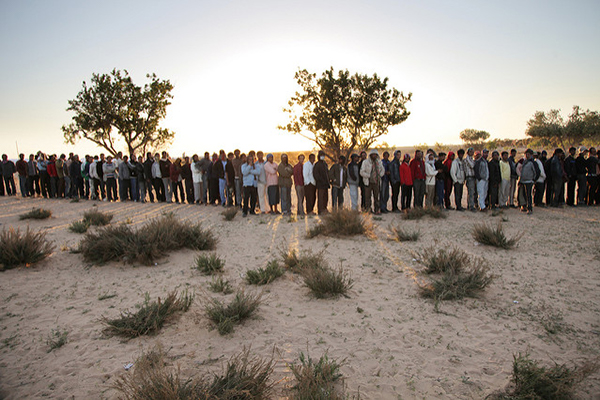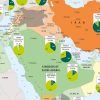
Whether one looks at the humanitarian situation, or at politics or at security, the overwhelming impression is that Libya is sinking into the abyss.
The scandal that broke out after the recent broadcast of images clearly showing a slave auction is unfortunately just one example in a territory that has become the chosen stamping ground of mafias that traffic at will, taking advantage of the country’s complete collapse.
Once again the “CNN effect” has struck, and after the images were broadcast, the overreaction of one African or Western government followed another, as if they had only just that moment discovered what has been going on for some time.
And this is happening in a country with considerable wealth, above all oil wealth, that is far more homogenous both ethnically and religiously than many of its neighbours and sparsely populated; conditions that should be conducive to the wellbeing and security of its 6.5 million inhabitants, and those passing through its territory.
That is far from being the case, however. The armed groups persist in seeking victory once and for all over their adversaries, an impossible goal in a scenario in which no one group is strong enough to impose their rule over the others. This inevitably results in the suffering of the population and in a political paralysis which the head of the United Nations Support Mission in Libya (UNSMIL), Ghassan Salamé, has been unable to overcome.
Libya, a fragmented territory
Since the fall of Muammar Gaddafi, the conflict has spiralled into a confrontation between a confusing mass of groups all seeking to exploit the resources within their reach, despite the claims of some to be defenders of the nation or the efforts of others to hide behind a thin veil of ideology.
Essentially, in this macabre zero sum game, it is important to understand that Libya today is a highly divided territory in which nobody really represents anybody and in which the majority of the actors on scene are seeking solely to make off with whatever is in their reach.
Some have made it their business to exploit the partially-recovered oil infrastructure for their own benefit, currently producing around one million barrels per day (compared to the 1.6 recorded at the beginning of 2011). Others, taking advantage of the fact that the country produces virtually nothing else (which means it has to import all kinds of products) prefer to fight for the control of informal commercial networks, which explains the many outbursts of violence in every part of Libya. And some shamelessly take full advantage of the misfortune of others at a time when at least 20 per cent of the population are affected by the humanitarian crisis (plus all those who arrive or transit through its territory).
In such circumstances, the short-term priority is simply to restore order and public services. But to do so, effective government is needed, something which neither the Government of National Accord, led by Fayez Mustafa al-Sarraj, less still the House of Representatives or the General National Congress (GNC) are capable of providing.
The absence of anyone with the legitimacy and authority needed to achieve minimum consensus on the political agenda has confirmed the impossibility of agreeing a reform of the Libyan Political Agreement signed in December 2015 in the Moroccan city of Shkirat. This was the task, which it has dismally failed, of the committee formed by Salame, of eight representatives of the House of Representatives and eight from the GNC, meeting at the UNSMIL headquarters in Tunis. And without agreement, it is unthinkable that a National Conference should be held, under the auspices of the UN, which should be followed by the approval of a new Constitution and the holding of presidential and legislative elections.
In the meantime, the European Union remains caught up appalling political paralysis, focused exclusively on strengthening its policing and seeking the collaboration of the African governments to halt the arrival of those desperately seeking refuge in Europe.
Awaiting a ‘Marshall Plan for Africa’ that has never materialised, the African Union-European Union Summit that took place on 29 and 30 November 29 in Abidjan, attended by 55 African heads of state and government and another 28 from Europe, concluded without progress.
In the meantime, Europe remains focused on its security-centred approach, trying to hold back the impulse of human beings to seek out a decent life, or to stake their future on the development of a continent that is forecast to reach 2.5 billion inhabitants by 2050.
This post was translated and updated by Equal Times.


